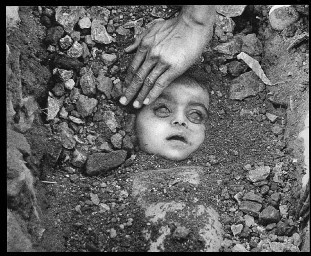|
Look over the urgent appeals below, and join us in taking
action!
.. . .. Stop
Dow from Staining IITs! Stop
Dow from Staining IITs!
... ... Sign
the Petition for Justice in Bhopal! Sign
the Petition for Justice in Bhopal!
... ... Link
your website to support Bhopal! Link
your website to support Bhopal!
Stop Dow from Staining
IITs!
Documents obtained through India's Right to Information law reveal
that Dow is attempting to forge links with at least
two IITs - Delhi and Mumbai - by offering to fund fellowships and/or
projects in the Chemical Engineering department. Dow Chemical’s
motive is not the furtherance of science and technology. Rather,
it is an attempt to acquire legitimacy and credibility by associating
itself with IITs, one of the best-respected educational institutions
in the world. Rather than risk staining its impeccable reputation
by associating with a corporation like Dow, IITs should reject all
Dow's overtures and send a strong signal that they stand by the
principles of justice and ethics.
 If
you're an IIT alumni, sign
the petition against Dow at IITs (you can also read the offline petition circulated against Dow at IITM here) If
you're an IIT alumni, sign
the petition against Dow at IITs (you can also read the offline petition circulated against Dow at IITM here)
 Read
the RTI documents from Delhi
and Mumbai IITs Read
the RTI documents from Delhi
and Mumbai IITs
 Get
involved. For more information, contact: Get
involved. For more information, contact:
..........•
Sudarshan Suresh:
(480) 363-0081
..........• Priya
Ranjan, IIT alumni: (301) 422-4441
Sign
the Petition Against Dow at IITs
To: IIT Director &
Head of the Chemical Engineering Department - All Seven
Institutes
26th April, 2007
Dear Sir/Madam:
We, the below-signed, are alumni
from various Indian Institutes of Technology. Representatives
of survivors of the 1984 Bhopal gas disaster informed us
that Dow Chemical, the owner of Union Carbide, is attempting
to forge links with IITs by offering to fund fellowships
and/or projects in the Chemical Engineering department.
We are writing to urge you to reject any such offer of a
relationship with Dow Chemical or any of its subsidiaries
for reasons mentioned below.
You are probably aware that
Union Carbide is a key accused in a criminal case related
to the Bhopal disaster where the company is charged with
“culpable homicide not amounting to murder.”
Because it failed to honour summons issued by the Bhopal
court, it was declared an absconder in 1992.
Dow Chemical has also failed
to obey the law and is currently being challenged in the
criminal court for sheltering a fugitive. Till date, it
has failed to make Union Carbide – its 100 percent
subsidiary – appear in court to face trial.
Aside from the disaster, Union
Carbide’s routine operations in the Bhopal factory
have resulted in a massive environmental contamination problem
that has not been addressed till date. Several thousand
tons of toxic wastes, obsolete pesticides and contaminated
material and machinery lie strewn in and around the factory
site. Over the years, these wastes have leached their poisons
into the groundwater. At least 10 governmental and non-governmental
studies document and confirm the spread of toxic contamination.
More than 20,000 people are forced to consume this contaminated
water in the absence of any alternative. Tests carried out
at IIT, Kanpur, by a New Delhi based fact finding mission
on Bhopal showed the presence of toxic chemicals such as
chloroform, chlorobenzenes, dichloromethane and heavy metals
such as lead and mercury in the breast milk of mothers in
these communities.
Union Carbide and Dow Chemical
have refused to contribute towards clean-up of the contamination
and groundwater.
As a result, Dow Chemical is
the target of a concerted campaign by Bhopal survivors and
their supporters, including ourselves. The aim of the campaign
is to hold the corporation and the Governments of India
and Madhya Pradesh accountable.
Dow Chemical’s track
record in India and abroad is poor on various counts:
• Earlier this year,
the company was fined $325,000 by the US Securities Exchange
Commission for having paid $200,000 in bribes to Agriculture
Ministry officials for expediting the registration of three
of its pesticides. One of the registered pesticides, Dursban
(chlorpyriphos), is freely sold in India whereas it has
been withdrawn from use in domestic settings in the US owing
to its demonstrated deleterious effects on the mental development
of children. An enquiry by the Ministry and another by the
Vigilance Commission is currently ongoing.
• In 2005, Indian Oil canceled a technology tie-up
with Dow Global Technologies Inc., a subsidiary of Dow Chemical,
because the company had attempted to sell a Union Carbide
technology by passing it off as its own.
• Dow is exerting tremendous pressure on the Indian
Government to get the Government to absolve it of all liabilities
related to Bhopal. Letters unearthed by the Bhopal survivor
groups indicates that Dow has written to the Indian ambassador
in an attempt to dictate the Government’s course of
action in a case against it for environmental clean-up in
the Madhya Pradesh High Court.
Dow’s poor track record,
particularly with respect to Bhopal, has made it very unpopular.
In May 2005, more than 1300 IIT alumni intervened and forced
the organizers of the Global IIT 2005 Conference to cancel
the key note address by William Stavropoulos, then CEO
of Dow Chemical.
In March 2007, the University
of California, Berkeley, returned a donation by Dow Chemical
towards organizing the UC Berkeley Energy Symposium after
students voted overwhelmingly against accepting funds from
the tainted company.
Dow Chemical’s motive
behind the relationship it is attempting to forge with IIT
is not the furtherance of science and technology. Rather,
it is an attempt to acquire legitimacy and credibility by
associating itself with the IIT.
IIT’s impeccable reputation
will certainly be tarnished by any association with Dow
Chemical. By rejecting any offers made by the company, IIT
will be sending a strong signal that it stands by principles
of justice and ethics.
Thanking You,
Sincerely,
Sign
the Petition!!!
|
- top -
Join
our Day of Action against Tata on Friday, April 6!
Don’t let Tata get Dirty Dow off the hook
| The Demand:
Ratan Tata must withdraw his proposal in
writing and communicate a copy of his withdrawal to ICJB. |
Bhopal Survivors
Call for Action Against Tata Group Because….
Tata Group chairman Ratan Tata has written to the Indian Government
offering to set up a fund to clean up toxic wastes and contamination
in and around the Union Carbide’s abandoned pesticide factory
in Bhopal, according to a January 17, 2007, article in the Indian
Express. On the face of it, this may seem like an offer of
good-will. But it is meant solely to let Union Carbide and its new
owner Dow Chemical off the hook. The article says Tata made this
offer “for "remediation" of the Bhopal gas tragedy
site to pave the way "for Dow Chemicals. . .to invest in India."
If Ratan Tata was truly interested in the well-being of Bhopal survivors,
he need not have waited 22 years to make this offer. And given Tata's
own history of environmental devastation - in the chromite mines
of Sukhinda (Orissa), Rallis pesticide factory in Patancheru (Andhrapradesh),
Tata salt works in Mithapur (Gujarat), and coalfields near Bokaro
(Jharkhand) - there's little reason to believe Tata will organize
a competent and comprehensive cleanup of the Bhopal site, which
of course the survivors demand above all else.
~ Action
Ideas ~
 Protest
at a Tata Facility Protest
at a Tata Facility
 Organize
a public rally Organize
a public rally
 Protest
at a Tata Facility Protest
at a Tata Facility
Do you live near a Tata office? If so,
organize a protest outside or attempt to meet with officials as
a delegation to express your concerns about Ratan Tata’s offer
to clean up Bhopal
What to Do
The no-frills plan is simple: hold signs or a banner outside the
office, near the entrance/exit, and hand out information about Bhopal
to the workers as they enter or exit. This is important because
the workers may not know much about Bhopal and because you can invite
the local media to cover your event (they like to cover protests).
Action Items
1. Drive by the
office beforehand so that you have an idea of what it looks like,
what might be public property, where you can hold your protest,
where you can park, etc. All this information will be very useful
to you later on. Also, find out when the workers enter or exit the
plant, and for how long - this will help you decide when in the
day to hold the protest.
2. Contact National
Lawyers Guild in your area to ask for a legal observer if you
can get one. You may also want to think about what is public property
and what is private, and whether you'll need a permit (and what
to do if you don't get one, and they tell you that you need one).
3. Make signs.
(this is fun)
4. Decide what
you want to hand out to the workers. Something simple, describing
what happened in Bhopal and how Dow is responsible (and how Tata
is helping them) should be fine.
5. Put out your
media advisory and invite the media to come
with you for the protest. Local TV may be interested - they like
protests.
6. Bring along
a camera or two yourself to take photos of the event.
7. If you’ve
chosen to, ask to speak with officials. Your protest shouldn’t
last longer than an hour.
Talking to Tata
YOU: Hi my name is MY NAME.
We've come here to protest Tata's efforts to get Dow off
the hook for the Bhopal chemical disaster.
1) Ratan Tata recently made an offer to clean up toxic wastes
and contamination in Bhopal.
2) While we are not opposed to a clean up, we think it should
happen legally, in adherence with the "polluter pays"
principle
3) In this context, the case against Dow Chemical is still
ongoing and the ministry of chemicals and fertilisers has
filed an application in a district court asking Dow to contribute
Rs 100 crore for remediation of the site.
4) In contrast, Tata's offer is extra-legal and will exonerate
Dow if it goes through.
5) We also think Tata's offer is insincere. If Tata is serious
about clean-up of toxic waste, he can begin by paying attention
to the contamination in sites owned by Tata companies, which
is often as bad, if not worse.
6) Therefore, we demand Ratan Tata must withdraw his offer
- in writing.
|
 Organize
A Public Rally Organize
A Public Rally
Hold signs or a banner at a prominent public place, and hand out
information about Bhopal to the public. Invite
the local media to cover your event (they like to cover protests).
Get signatures from the public for the petition against Tata and
the Government of India (see below).
Resources
 More
information about contamination in Bhopal More
information about contamination in Bhopal
 Tata
Information Sheet (pdf) Tata
Information Sheet (pdf)
 Detailed
FAQ on Tata (doc) Detailed
FAQ on Tata (doc)
 Tata
rap sheet (doc) Tata
rap sheet (doc)
 Possible
slogans to use for placards, signs and banners Possible
slogans to use for placards, signs and banners
..........• Tata: Don’t
let Dow get away with it
..........• Ratan Tata: Friend
of Dow, Enemy of Bhopal Gas Survivors
..........• Rotten Tata
..........• Tata Bye-Bye
 Sample
press release Sample
press release
 SfB
Trifold Brochure SfB
Trifold Brochure
 Petition
against Tata Petition
against Tata
 Petition
against Government of India Petition
against Government of India
 Find
a Tata office near you Find
a Tata office near you
 Background
information Background
information
Tata Offices
New York, NY (World Financial Center)
1 World Financial Center, 21st Floor
New York, NY 10281
Phone: 212-313-6800
Fax: 212-786-0120
New York, NY (Park Avenue)
101 Park Avenue, 26th Floor
New York, NY 10178
Phone: 212-557-8038Bottom of Form
Tata Boston
101 Federal Street, Suite 1900
Boston, MA 02110
Phone: 617-342-3629
Fax: 617-342-7233
Seattle, WA
4104 148th Ave NE
Redmond, WA 98052
Phone: 425 497-7200
Fax: 425 895-0408
Cincinnati, OH
250 East 5th Street 15th FL
Cincinnati, Ohio 45202
Phone: 513-772-6603
Fax: 513-772-9176
Atlanta, GA
115 Perimeter Center Pl., Suite 660
Atlanta, GA 30346
Phone: 770-396-1223
Fax: 770-396-1239
San Diego, CA
12730, High Bluff Drive #120
San Diego, CA 92130
Phone: 858 259-4101
Fax: 858 259-4104C
San Francisco, CA
425 Market Street, Suite 2250
San Francisco, CA 94105
Phone: 415-955-2605
Fax: 415-955-2794
Background
Information
Union Carbide is known as the Butcher of Bhopal. In December 1984,
Union Carbide’s pesticide factory in Bhopal leaked a poisonous
gas and killed more than 8000 people within days. Since then, the
death toll has risen to more than 20,000. The disaster happened
because the Carbide had installed an inherently dangerous technology,
and dismantled safety systems to save costs.
Immediately after the disaster, the Central Bureau of Investigation
pressed criminal charges against Union Carbide Corporation and its
senior executives. However, no progress has been made on the criminal
case against UCC because the company has refused to honour the summons
of Indian courts. It was declared an absconder in 1992.
In its hurry to flee India and run back to the United States, UCC
abandoned several thousand tons of toxic wastes in and around its
factory site in Bhopal. Those poisons have leaked into the groundwater.
Now, more than 25,000 people are forced to drink water laced with
Carbide’s poisons. The most immediate need in Bhopal is for
clean water for these communities. Simultaneously, the Indian Government
needs to force Union Carbide, or its new owner Dow Chemical, to
pay for clean-up of the toxic wastes and the damages caused by it
to people’s health and properties.
The Official Position
The Government of India has written to a US Court indicating that
the offending corporation would need to pay for clean-up. Also,
the Union Ministry of Chemicals has filed an application in the
Madhya Pradesh High Court asking Dow Chemical to pay Rs. 100 crore
(Rs. 1 billion) toward clean-up. The Technical Sub-committee of
a Task Force set up by the MP High Court to look into the Bhopal
contamination has unanimously concluded that the priority option
to deal with the hazardous wastes is to ask Dow Chemical to ship
it to USA for final disposal.
American Threats – Bhopali Response
The US Government has warned the Indian Government that any action
against the American multinational will harm American investments
in India. However, Bhopal survivors and their supporters have resolved
that Union Carbide and Dow Chemical will not be allowed to do business
in India until the criminal liabilities and issues relating to toxic
waste and related health and property damage are resolved.
The Silent Disaster
The Bhopal factory site is a Global Toxic Hotspot. People knew about
Union Carbide’s pollution from and environmental contamination
by Union Carbide several years before the disaster. Evidence at
hand confirms that Union Carbide knew about the leaching of poisons
into the groundwater as early as 1981. Carbide scientists knew about
the severe toxicity of the groundwater in 1989. A 1999 study by
Greenpeace reported presence of neurotoxic mercury 6 million (60
lakh) times higher than normal. Carbon tetrachloride, a suspected
carcinogen, exceeded limits set by World Health Organisation by
1705 times. However, Union Carbide chose to remain silent and even
deny contamination. As a result, numerous people, primarily children,
are suffering. Numerous children are being born with serious deformities
and health problems, such as cerebral palsy, cleft lip, missing
palate, and missing digits.
Tata's environmental record
The Tata group of companies have a dismal environmental record.
The Comptroller and Auditor General of India had singled out Tata's
Chromite mines in Sukhinda, Orissa for causing widespread pollution
and health damage. Similarly, the Supreme Court Monitoring Committee
on Hazardous Wastes has passed strong comments against waste disposal
by Rallis – a Tata company manufacturing pesticides in Patancheru,
near Hyderabad. In Mithapur, Gujarat, Tata's factories have contaminated
ground water and destroyed agriculture in several villages. In Jamshedpur,
where the Tatas run a steel plant, thousands of tons of boiler ash
containing toxic heavy metals are dumped in the middle of the city
at Jugsalai. Tata's collieries at West Bokaro in Jharkhand have
contributed to the irreparable damage caused to the Bokaro river.
In the Gulf of Kutch, Tata Chemicals is accused running an effluent
pipe line through a reserve forest and a sanctuary.
Given the widespread environmental pollution by the Tatas, it is
small wonder that Mr Ratan Tata is trying to subvert the Polluter
Pays principle in Bhopal which could well be a powerful precedent
against corporate crimes against the environment.
 Watch these
interviews with Bhopal survivors as they discuss the Tata "offer"
(warning: it's in Hindi)
Watch these
interviews with Bhopal survivors as they discuss the Tata "offer"
(warning: it's in Hindi)
For more information, contact: bhopalcampaign@gmail.com
Visit: www.bhopal.net or www.studentsforbhopal.org
- top -
Sign the Petition
for Justice in Bhopal!!
 Sign the Petition!
Sign the Petition! 
Twenty years after the 1984 gas leak in Bhopal, India, known as
the "Hiroshima of the chemical industry," it remains the
worst industrial disaster in human history.
|
Two days of
horror...two decades of apathy |
On the night of Dec. 2nd and 3rd, a leak at Union Carbide’s
pesticide plant in Bhopal released more than 27 tons of methyl isocyanate
and other deadly gases. NONE of the plant’s six safety systems
were functioning that night, due to Carbide’s corporate cost-cutting
and admitted use of “unproven” technologies in the design
of the plant.
Among the 500,000 people exposed to the gas, 20,000 have died till
date and 120,000 continue to suffer devastating health effects as
a result of their exposure. Toxic waste left behind by Carbide at
the factory site continues to poison those Carbide first poisoned
20 years ago.
In 2001, Michigan-based chemical corporation Dow Chemical purchased
Union Carbide, thereby acquiring its assets and liabilities. However
Dow Chemical has stubbornly refused to clean up the site, provide
safe drinking water or medical treatment for those who need it.
After 20 years of struggle, the campaign for justice in Bhopal is
one of the longest-running and most important struggles against
corporate crime in the world. Despite the horror of "that night"
and the chemical terror that its survivors have endured, the people
of Bhopal continue their struggle for justice, for corporate accountability,
and for their basic human right to an environment free of chemical
poisons. The outcome will have lasting implications for the future
of globalization, the labor and environmental movements, and the
health and well-being of the people of Bhopal.
The people of Bhopal have waited long enough for justice. Please
support their struggle by signing the online petition at http://www.studentsforbhopal.org/Petition/bhopal.php
and urging your friends to do the same!
WE ALL LIVE IN BHOPAL
- top -
Link your website
to support Bhopal!
Courtesy of Be
the Change
Do you have a website, a blog, or a French poodle? If you have
either of the first two, you can help spread the word about Bhopal
- simply add these diagonal banners to the top of your website!
To see what they look like in action, visit
here. To download the actual banners,
click here.
Note: The code below is to be put between the <head>
and </head> tags of your template.
Bhopal Left Diagonal Band
<!-- Bhopal left code starts-->
<script type="text/javascript"
src="http://www.geocities.com/ganganesh86/bhopalleft.js">
</script><noscript>
<a href="http://www.studentsforbhopal.org">
http://bhopal.aidindia.com/</a></noscript>
</head>
<!-- Bhopal left code ends-->
Bhopal Right Diagonal Band
<!-- Bhopal code right starts here-->
<script type="text/javascript"
src="http://www.geocities.com/ganganesh86/bhopalright.js">
</script><noscript>
<a href="http://www.studentsforbhopal.org">
http://bhopal.aidindia.com/</a></noscript>
</head>
<!-- Bhopal code ends here-->
- top -
Endnotes
(1) According to The Centre
for Rehabilitation Studies’ (an office of the Madhya Pradesh
government’s Bhopal Gas Tragedy Relief and Rehabilitation
Dept.) 1998 Annual Report, the mortality rate among the exposed
community in 1997 was 6.70/1000, whereas in the unexposed community
it was 5.37/1000, producing a figure of 665 deaths above the mortality
rate in the exposed community - or approximately 50 gas related
deaths per month. No official figures exist for subsequent years.
Further, according to a 1987 ICMR report, the mortality rate in
the exposed community was 9.98/1000 and in the unexposed community
was 6.03/1000, meaning approximately 150 gas related deaths per
month in 1986. Assuming a steady ratio of depreciation in mortality
of 6% per year, in 2003 there were therefore over 30 deaths per
month due to gas exposure. However, it is worth noting that six
monthly morbidity studies conducted by the ICMR between 1987-1991
show that the number of people with gas related symptoms actually
increased in that period.
|
 IN
BHOPAL
IN
BHOPAL





